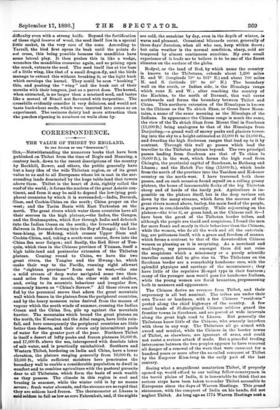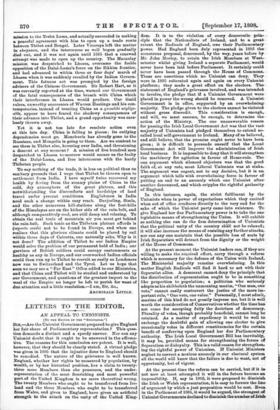CORRESPONDENCE.
THE VALUE OF THIBET TO ENGLAND.
TO THE EDITOR OP THE " SPICTATOR:1
$111,—Notwithstanding the numerous books that have been published on Thibet from the time of Bogle and Manning, a -century back, down to the recent descriptions of the country by Rockhill, Bower, and others, the public generally have but a hazy idea of the wide Thibetan region, or of its great 'value to us and to all Europeans whose lot is east in the sur- rounding lands dominated by the huge table-land that towers above them. Thibet is the heart of Asia, rightly called the roof of the world ; it forms the nucleus of the great Asiatic con- tinent, and from it may be said to depend the low-lying peri- pheral countries by which it is surrounded,—India, Burmah, Siam, and Cochin-China on the south ; China proper on the -west; and the Tarim Basin with East Turkestan on the north. The great rivers which water these countries have all their sources in the high platean,—the Indus, the Ganges, and the Brahmaputra, which flow through India and debouch 'into the Indian Ocean on the south ; the Irrawaddy and the Salween in Burmah flowing into the Bay of Bengal ; the Lan- taan-kiang, or Mekong, which crosses Upper Siam and 'Cochin-China, and, taking a south-west course, flows into the China Sea near Saigon ; and finally, the Red River of Ton- quin, which rises in the Chinese province of Yunnan, itself a high table-land and peninsular extension of the Thibetan plateau. Coming round to China, we have the two great rivers, the Yangtse and the Hwang - ho, which 'make their way to the Pacific, running right athwart the "eighteen provinces" from east to west,—the one a solid stream of deep water navigated some two thou- sand miles from its mouth, the other wide and shallow, and, owing to its eccentric behaviour and irregular flow, .commonly known as "China's Sorrow." All these rivers are fed by the perennial snows that adorn the great mountain wall which fences in the plateau from the peripheral countries, -and by the heavy monsoon rains derived from the masses of vapour which the south winds of summer, crossing the Indian 'Ocean and the China Sea, pile up against the mountain -barrier. The mountains which bound the great plateau on the north, the Kwenlun and the Altai ranges, have little rain- fall, and here consequently the peripheral countries are little better than deserts, and their rivers only intermittent pools of water for the greater part of the year. Northern Thibet is itself a desert of lofty peaks and frozen plateaus 16,000 ft. and 17,000 ft. above the sea, interspersed with desolate lakes of salt water, and is practically uninhabited. Southern and Western Thibet, bordering on India and China, have a lower elevation, the plateau ranging generally from 10,000 ft. to 13,000 ft., while sufficient moisture here penetrates the boundary wall to enable a considerable population to dwell in aomfort and to combine agriculture with the pastoral pursuits dear to all Thibetans, which form the basis of such wealth as they possess. The climate in this region is cool and bracing in summer, while the winter cold is by no means severe ; fresh water abounds, and the streams are so rapid that they are seldom hard frozen. The thermometer at Lhassa is said seldom to fall as low as zero Fahrenheit, and, if the nights
are cold, the sunshine by day, even in the depth of winter, is warm and pleasant. Occasional blizzards occur, generally of three days' duration, when all who can, keep within doors ; but calm weather is the normal condition, sharp, cold air tempered by almost continuous sunshine. My own small experience of it leads me to believe it to be one of the finest climates on the surface of the globe.
Bodyul, or the land of Bod, by which name the country is known to the Thibetans, extends about 1,200 miles E. and W. (longitude 79° to 101° E.) and about 700 miles N. and S. (latitude 28° to 40° N.) The boundary wall on the south, or Indian side, is the Himalaya range which runs E. and W.; after reaching the country of the Kachins, to the north of Burmah, this wall turns northwards and forms the boundary between Thibet and China. This northern extension of the Himalayas is known to the Chinese as the Ta shileh Shan, or Great Snow Moun- tains, a name of the same meaning as the Himalaya of the Indians. In appearance the Chinese range is much the same, the view of the Ta shiieh Shan from Mount Omi in Szechuan (11,000 ft.) being analogous to that of the Himalaya from Darjeeling,—a grand wall of snowy peaks and glaciers tower- ing into the sky to a height estimated at 22,000 ft to 24,000 ft., and dwarfing the high Szcheuan ranges that lead up to it by contrast. Through this wall go passes which lead the traveller to the Thibetan plateau beyond. The two principal passes leading from Szechuan are that of Ta chien 111 (8,000 ft.), in the west, which forms the high road from Chi:-Ingtu, the provincial capital of Szechuan, to Bathang and Lhassa ; and the Ilsileh Pao ting (13,000 ft.), which leads from the north of the province into the Tsaidam and Kokonor country on the north-west. I have traversed both these passes, and on each occasion found myself on a rolling grassy plateau, the home of innumerable flocks of the big Thibetan sheep and of herds of the hardy yak. Agriculture is im- possible on the plateau itself, but in the deep ravines cut. down by the many streams, which form the sources of the great rivers named above, barley, the main food of the people, is grown in considerable quantity. While sojourning on the plateau—the ts'ao ti, or grass land, as the Chinese call it—I have been the guest of the Thibetan border tribes, and although the people are timid and suspicious, I found the men far more frank and manly in their behaviour than the Chinese, while the women, who do all the work and all the entertain- ing, are politeness itself, with a grace and freedom of mannet which forms a contrast to that of the downtrodden Chinese women as pleasing as it is surprising. As a merchant and wool-buyer, my presence amongst them did not raise the suspicions which a missionary or a purely scientific traveller cannot fail to give rise to. The Thibetans on the Szechuan border are a remarkably handsome race, with the splendid physique and carriage of the mountaineer; they have little of the repulsive Mongol type in their features ; many of the younger men would pass for handsome Italians, while the young women are florid brunettes, prepossessing both in manners and appearance.
The Chinese derive no revenue from Thibet, and their supremacy is all but nominal. The tribes are under their own Tu-sze or headmen, with a few Chinese "residents" posted along the chief highways of the country. A few small bands of ill-disciplined Chinese soldiers guard the frontier towns in Szechuan. and are posted at wide intervals along the great high road to Lbassa. But generally the Thibetans know little of the Chinese, who scarcely interfere with them in any way. The Thibetans all go armed with sword and musket, while the Chinese in the border towns of Thibet, as elsewhere, are ignorant of arms, and could not resist a serious attack if made. But a peaceful trading intercourse between the two peoples appears to have removed all danger of a renewal of the wars that were constant for a hundred years or more after the so-called conquest of Thibet by the Emperor Kien-lung in the early part of the last century.
Seeing what a magnificent sanatorium Thibet, if properly opened up, would afford to our toiling fellow-countrymen in the torrid plains of India, it is lamentable to think that no serious steps have been taken to render Thibet accessible to Europeans since the days of Warren Hastings. This grand statesman, with the conquest of India on his hands, did not neglect Thibet. As long ago as 1774 Warren Hastings sent a
mission to the Teshu Lama, and actually succeeded in making a peaceful agreement with him to open up a trade route between Thibet and Bengal. Later Viceroys left the matter in abeyance, and the intercourse so well begun gradually died out, and it was not again until 1885 that a renewed attempt was made to open up the country. The Macaulay mission was despatched to Lhassa, overcame the feeble opposition of the Dalai-Lama's force on the Sikkim frontier, and had advanced to within three or four days' march of Lhassa when it was suddenly recalled by the Indian Govern- ment. This fatuous act was prompted by the foreign advisers of the Chinese Government Sir Robert Hart, so it was currently reported at the time, warned our Government of the fatal consequences of the breach with China which their interference in Lhassa would produce. Our timid rulers, unworthy successors of Warren Hastings and his con- temporaries, instead of treating China as a quantite néglige- able, appear to have feared the shadowy consequences of their advance into Thibet, and a grand opportunity was care- lessly thrown away.
Yet it is not too late for resolute action even at this late day. China is falling to pieces : its outlying dependencies must go. Manchuria has already gone to the Russians, and Mongolia is going to them. Are we content to see them in Thibet also, hovering over India, and threatening a descent at any moment ? A mission of five hundred men despatched to Lhassa to-morrow would secure us the fealty of the Dalai-Lama, and free intercourse with the hardy Thibetan people.
To say nothing of the trade, it is less on political than on sanitary grounds that I urge that Thibet be thrown open to settlement from India. I have myself twice recovered my health by fleeing from the steamy plains of China to the cold, dry atmosphere of the great plateau, and this notwithstanding the discomforts and hardships of land travel under present conditions. Englishmen in India need such a change within easy reach. Darjeeling, Simla, and the other numerous hill-stations along the foot-hills of the Himalayas are on the hither side of the rain-belt, and although comparatively cool, are still damp and relaxing. To obtain the real tonic of mountain air you must get behind the rain-belt. Such tonic as the Thibetan plateau affords is (experto crede) not to be found in Europe, and when one realises that this glorious climate could be placed by rail within three days of Calcutta, one naturally asks, Why is it not done? The addition of Thibet to our Indian Empire would solve the problem of our permanent hold of India ; our garrison of British soldiers could occupy cantonments as healthy as any in Europe, and our overworked Indian officials could then run up to Thibet to recruit as easily as Londoners now run to Switzerland and the TyroL Let us hope that soon we may see a "Far East" Office added to our Ministries, and that China and Thibet will be studied and understood by our Government, and questions of the greatest import to the weal of the Empire no longer be left to perish for want of due attention and a little resolution.—I am, Sir, &c.,
ARCHIBALD LITTLE.



































 Previous page
Previous page